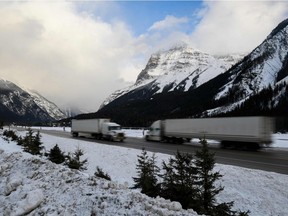Industry officials say the surest solution is to ‘get rid of the old crap’ still operating on our roads

Metro Vancouver is looking for solutions to drive down emissions from medium and heavy trucks, which contribute to global warming and adverse health issues.
If tampering proves to be widespread — and industry experts believe it is — Metro Vancouver’s emission inventory likely underestimates emissions from medium and heavy trucks, the report said.
John Lindner, air quality planner with Metro Vancouver, said truck owners and operators may tamper to reduce maintenance and fuel costs, since the emission controls use a small amount of fuel to operate and require periodic maintenance.
“Metro Vancouver is working with partners to confirm this understanding and explore any opportunities to repair tampered vehicles,” he said.
The issue stems from historical and ongoing challenges with emissions controls in the trucking industry, said Dave Earle, president of the B.C. Trucking Association.
He said it’s not just a B.C. problem but one across North America, noting there was a generation of heavy duty vehicles that didn’t work properly. He highlighted the ineffectiveness of early emission control systems, leading to widespread removal of these systems, particularly in trucks from 2003 to 2016.
“Manufacturers figured it out eventually. It just took them 12 or 15 years,” he said, adding that the older emission controls are “unbelievably problematic, even to this day.”
Earle emphasized the need for fleet turnover to newer, more reliable vehicles with emissions controls to meet emissions targets. He noted battery electric and hydrogen fuel cell trucks have limitations in load capacity, the distance they can travel on a charge, and cost.
“We have to be careful,” he said. “With older vehicles we cannot get the parts. They don’t exist. So you can’t go out and say, ‘go out and fix your stuff with the right parts,’ because those parts don’t exist.”
The trucking industry is a difficult sector to decarbonize because of the high cost associated with zero-emission vehicles and renewable fuels, and a lack of infrastructure, the report notes.
“The solution is to turn over the fleet. It’s to get rid of the old crap that doesn’t work and get the new stuff that does out there as quick as we can. The newer the vehicle is, the less fuel it burns, the more reliable it is. That’s key,” said Earle.
The report looks at the three solutions to decarbonizing the industry: transitioning to lower emission or zero-emission vehicles; switching to vehicles that use renewable fuel, primarily renewable diesel; and shifting truck trips to lower emission modes such as rail, short-sea shipping and cargo bikes.
Earle said there is reliable electric technology in the works for heavy duty vehicles, but it’s not there yet.
“Our members are really interested and committed to electric technology but it can’t move big loads yet,” he said, adding the maximum range is only about 260 kilometres.
“It just doesn’t work now, but it’ll get better. And then hydrogen is years behind that.”
Staff recommend Metro Vancouver advocate for the federal government to increase the availability of cleaner engines and zero emission vehicles, and push the B.C. and federal governments to increase the supply of renewable fuels and reduce the cost of zero-emission vehicles.
They also suggest Metro work with the B.C. Trucking Association and the Port of Vancouver to increase the use of new, cleaner engines.
Metro Vancouver is in the process of replacing its own fleet of 300 gas-powered vehicles, including 68 light-duty trucks, with electric vehicles by 2030.
Medium and heavy trucks emit 10 per cent of diesel particulate matter emissions and 12 per cent of nitrogen oxides emissions in the region, according to Metro Vancouver’s emissions inventory.
Diesel particulate matter and nitrogen dioxide are two of the air contaminants with the largest health impacts in Metro Vancouver, the report says. It concludes that staff will continue to work on projects with key partners to evaluate emission reduction options, and will report back with results at a later date.
Transportation is one of the biggest sources of B.C.’s emissions, heat-trapping gases driving global warming. The province’s commercial transportation sector makes up 60 per cent of all transportation-related greenhouse gas emissions and a quarter of total emissions.
With files from Cheryl Chan